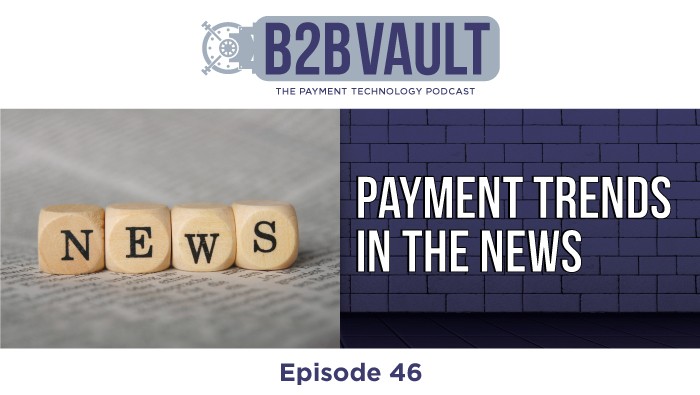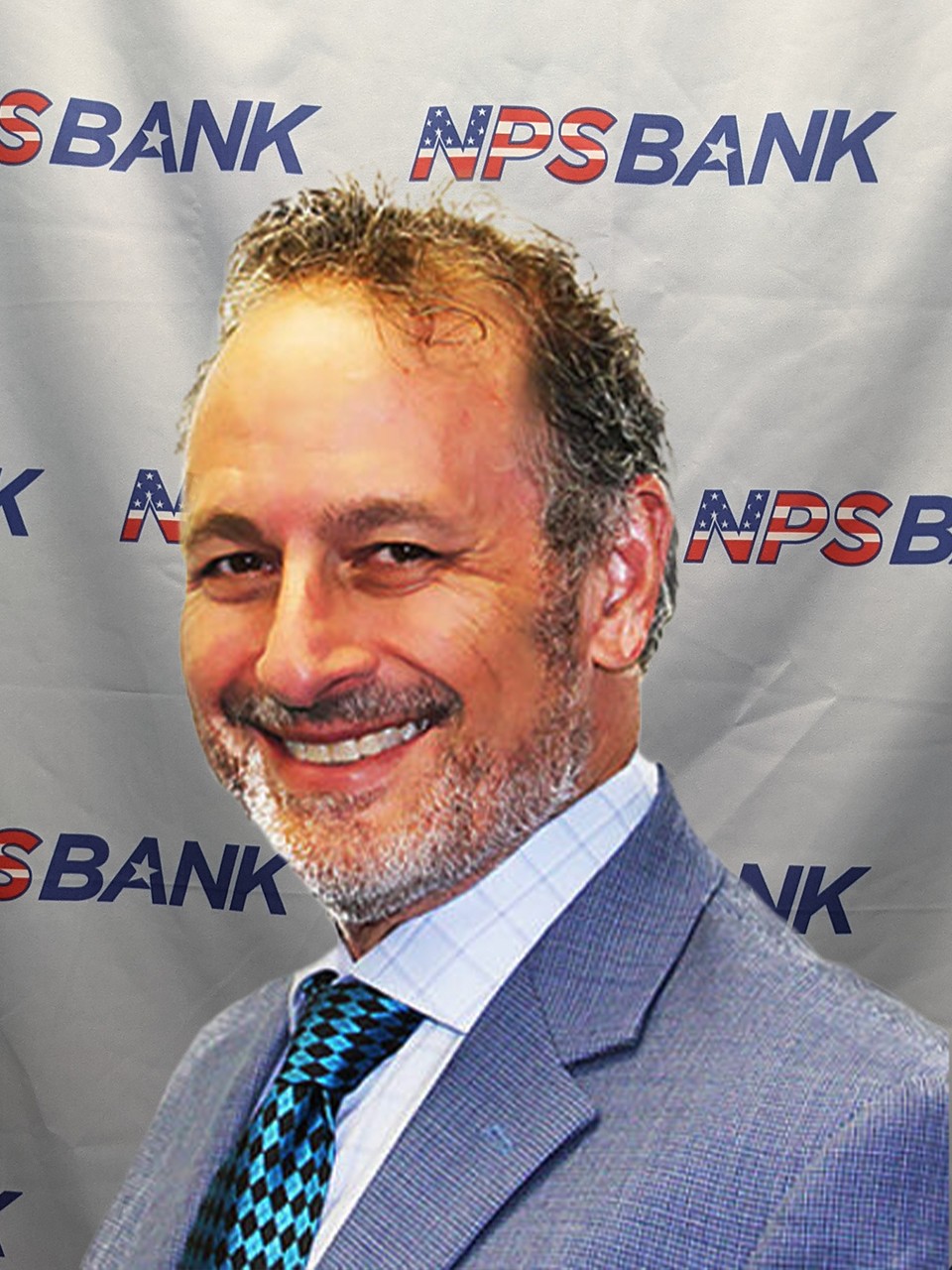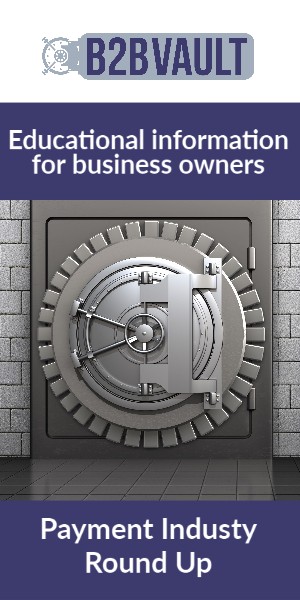

Video Transcription
Hi, everybody. Welcome to B2B Vault – The Payment Technology Podcast, educational information for business owners and merchants, and today’s podcast. We’re going to be talking about payment trends in the news. You can always catch us on all the networks, Spotify, Apple Podcasts, Google podcasts, YouTube. If you like videos, I heart Stitcher and even Amazon music and follow us on Facebook, Twitter, and Instagram @b2Bvault. So payment trends are in the news. Let’s talk about B2B payments. This vertical has been growing, and we noticed it growing quite a few years ago. Still, according to Visa, MasterCard, Notcha, many people don’t want notch because it’s the national association involving ACH. The moving of electronic checks, 7.5 billion in transactions in the fourth quarter of 2021, 6.1% over the same period in 2020. And that’s incredible. That’s just the movement of electronic checks. A lot of that is driven by the pandemic because while many people were not in their office during the pandemic, they needed to set up payment portals, which we do. And that way, customers can get invoices. And then, instead of the checks and the mail, they could go to the payment portal and pay by credit card or pay by ACH each check. And that’s why you see each explode. Each check started exploding probably 2000. We saw it start growing in 2017, 2018, 2019. And it’s just growing and growing, and growing payment portals have been the driving force and B2B. So you can send out an invoice to your customers, give them a link or display the link on your website, or have a hidden link. And then they can go in. They can pay their bill with you 24 hours a day. You know, we’re dealing with an economy now that’s running 24 hours a day. People are doing business on the is located on the east coast. You’re doing business with people on the west coast, trying to get people to pay you.
This can be a fast way for you to get paid, and it’s efficient and straightforward to use. Very easy to understand, you know, many people are into this whole paper check thing. Still, I think paper checks are started to seem like a big decline as payment portals have become away, especially in the world of B2B to do business. And also, credit card processing in the B2B world is up to because it makes for an easy way for people to pay. It’s also perfect for the business. You know, as a business owner, I would rather somebody hand me over their credit card. Then I have to wait to get paid because 30 days turns into 60 days. Sixty days turn into 90 days. Ninety days turn into 120 days. And if you don’t have that money on hand in your bank account, then you’re going to, you know, you’re losing, you’re losing money every single day. So it’s better sometimes to take a credit card. Not sometimes, take the credit card, pay the small fee, take the ACH. You know you can even charge your customers. Let’s say 2% take their credit card and offer them free ACH, which is much cheaper than credit card processing. Okay. And then that way, you could leverage them to get them to pay you faster. The whole idea is to get paid faster get money in your bank account. That’s how we help businesses and B2B payments. And let me tell you, you know, if you are a business and you do business with other businesses, this is something that you should look into. So other things that are being discussed in the same news day, ACH payments, okay. This is probably not.
They’ve been talking about this for probably five years, same day, ACH payments. I think it’s getting very, very close right now to happen. It’s happening on some sub-scale, you know, for larger type businesses, they can make, get that to happen. But in general, I think it’s going to be, it’s going to be another year or two, but push the card has now come in. Many large merchants were using push to card, but now it’s available for just about anybody. So what’s the business case for, you know, push to card and using that. And it’s not just pushing the card; it’s because when you’re pushing to the card, you’re pushing to a debit card, which essentially is a bank account. So let’s say you I’ll give some good examples of who uses push the card. So a good example is Uber. They use push cards. So you’re driving your Uber all day. Let’s say you earned 150 bucks, or maybe you wait a few days till it’s, you know, built up. And now you say, oh, I want my hundred and 50 bucks. Well, Uber has your debit card. You hit to get paid. Now their system automatically connects out to the push to card payment software. And it says, boom, send driver a, there let’s say they made $240. Send them there $240, and it sends it. And it’s in the person’s bank account, literally in about less than an hour. Sometimes it’s faster than that, depending on how busy it is, but that’s operating, you know, 24 hours a day. It’s like issuing like a credit. So, boom, you know, as long as your bank is open, the money’s going in your bank account. So how can other businesses use push the card? Let’s say your offer rebates to people who buy products from you. You already have their credit card information. Now you can, as long as you’re on the same payment system, right. With push the card. So you’re getting the payment in.
Now you need it off. You’re given a rebate, you can push out, you know, that $5 rebate to their card, you know, or maybe whatever the rebate are going to, or let’s say you’re a consumer loan company. So you’re a consumer loan company, and you’re doing loans to consumers. And then let’s say they go into a dentist’s office or a furniture store. And then the consumer is getting alone, or they’re coming to your website, and they get a loan for 2000, $3,000 instead of waiting to send an ACH or sending them a check in the mail, you can push to their card, and they can have the money there instantly. And then they can spend that money in the business where they’re, why they need to get that loan. So there are a lot of good cases to use, push the card, payout commissions to people, paying out other kinds of pain. Your employees maybe be paying out in a multi-level marketing situation, paying out your commissions to the people in the multi-level marketing. So there are a lot of cases where you can use push the car. Cause you’re not just pushing through the card, you’re pushing to the bank account. So this is a great service. We’re probably going to talk more about pushing the card in another episode and going over exactly what’s going on. So now, let’s talk about more taxes on small businesses. So this is crazy. You know, here’s another story, NBC news. And now it’s not just national news before this was in the national news. It was on a few national stations, but now it’s starting to be followed by the local news. I’ve seen this pop up on other local news stations, but now this thing is popping up, and businesses need to be where pay pal, Venmo, Zelle, all of these companies, cashapp, they are watching how many transactions you’re doing. And if you’re doing more transactions than just, Hey, I went to lunch with my friend, and my friend had sent me 20 bucks. You’re doing transactions every day, lots and lots of transactions in your business there. You’re going to be asked to switch over to a business account so that you’re not using the personal account and the IRS on this $600 rule. They want their pound of flesh the tax, and you can prove what that was all about later. So they’re going to say because you’re going to get a 10 99 from Zell. Let’s say I loaned some money to my son.
Then he has to give me 50 bucks. Every time he gets paid. Well, at the end of the year, that’s going to be a lot more than 600 bucks. And then I’m going to have to tell my account. And like all of that was from paying my son, you know, and my son was paying me back cause I loaned him some money. Right. Which is perfectly fine. But let’s say you have a garage sale every week. There was a movie with Tom Hanks one time, and his neighbor had a garage sale every week. I can’t remember the name of that movie, but it was funny, it was a good movie. He went back to college later in life. He was driving around in a scooter, and his neighbor was Cedric, the entertainer, and he kept having a garage sale every week. Well, if that’s you, you have a garage sale every week, then, you know, they’re going to say you’re running a business because you’re going to get a 10 99 for all that. So you need to set up, you know we’ll be setting up, you know if you’re out of a business, a side gig I’ve talked to one guy who used to work for me, and he used to buy typewriters and fix them up and sell them. And I was like a side hustle, you know? And cause he likes to do it. I said, you know, you need to start keeping business records because you’re going to get whacked with all kinds of taxes because you got money coming in. You’re going to get that you’re going to get a 10 99 from PayPal. And then, you know, you’re not deducting at your cost of goods or the cost it costs you to run the business. You know, you have a cell phone, maybe you’ve run an ad on eBay, and then you’ve got to pay them a commission and all this stuff, you gotta, you got to track everything. So even if you have a side hustle, it’s straightforward to file a DBA with the state for 30, 40, 50 bucks, whatever that costs, open up a separate bank account at your bank, track your expenses. When you file your taxes, there’s a small form. You can do like, oh, I have a small business. And that way you’re, you know, you’re going to cover yourself. Either that or get a real merchant account, you know, if you’re making enough money and it makes sense, crypto taxes on this year’s 10 40. The bill said they were not going to do this until 20 24, 20 25. Guess what? Surprise. And I even went into my Coinbase account today to look, I saw a little new tab there, and it said tax information. And then in there, it’s had in there something about unrealized gains. I don’t know. I will have to download that and send it to my accountant because I’m not sure what that’s all about, but it’s worth investigating if you’ve been buying, selling, trading crypto; it’s on the 1040 this year. I would be consulting with my tax professional. I am not a tax professional. I don’t give tax advice or legal advice, but I would say that this is a moving target. Now we offer a product where someone could pay you in crypto, but you get cash in your bank account, which is a great way to accept crypto payments and avoid dealing with the IRS. Okay. There’s a bunch of episodes on B2B Vault all about crypto. We talk about different types of businesses that can use crypto. So if there’s something that you heard in the podcast today, and we can help you @nationwidepaymentsystems and visit the website npsbank.com you can fill out an application form, and we’ll call you, or you can schedule an appointment on the appointment tab. We’ll talk to you about all the solutions we offer at nationwide payment systems. So B2B Vault is available on Spotify, Apple, Google podcasts, YouTube, Stitcher, iHeartRadio, Amazon music, follow us on social media. So I hope everybody enjoyed today. The payment trends in the news, everybody have a great day and Carpe Diem.
SUBSCRIBE TO OUR NEWSLETTER
Related Articles
No Results Found
The page you requested could not be found. Try refining your search, or use the navigation above to locate the post.





